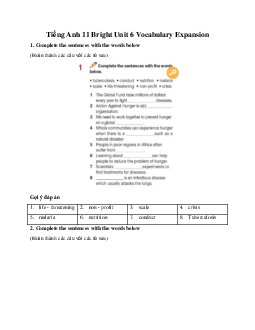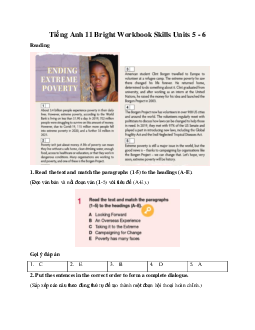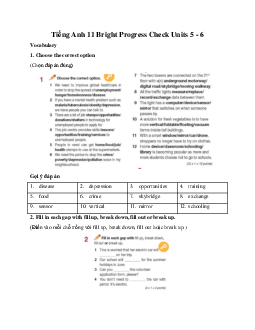




Preview text:
Tiếng Anh 11 Bright Unit 6 6d Speaking Public service help
1. a) Fill in each gap with cash, equal shelters, stamps or training. Then listen and check.
(Điền vào mỗi khoảng trống bằng cash, equal shelters, stamps hoặc training. Sau đó nghe và kiểm tra.) Gợi ý đáp án 1. training 2. shelters 3. cash 4. stamps 5. equal
b) Can you think of other ways to help citizens in need?
(Bạn có thể nghĩ ra những cách khác để giúp đỡ những công dân gặp khó khăn không?) Gợi ý đáp án
- Providing affordable housing: Governments can work to create and maintain affordable
housing options for citizens who are struggling to make ends meet.
- Offering childcare support: Providing affordable or subsidized childcare options can
help support working parents and reduce the financial burden of childcare.
- Creating job training programs: Offering training programs for in-demand jobs and
industries can help individuals gain the skills they need to secure stable employment. Everyday English
Expressing opinions & Agreeing / Disagreeing
2. a) Listen and read the dialogue. What are Jeff and Nancy discussing?
(Nghe và đọc đoạn đối thoại. Jeff và Nancy đang thảo luận điều gì?) Gợi ý đáp án
Jeff and Nancy are discussing free education.
b) Which of the underlined phrases/ sentences are used for expressing opinions? agreeing? disagreeing?
(Những cụm từ / câu được gạch dưới được sử dụng để bày tỏ ý kiến? đồng ý? không đồng ý?) Gợi ý đáp án
- Expressing opinions: To my mind./ It’s seem to me that/ Personally, I think …
- Agreeing: You’ve got a point there.
- Disagreeing: I’m not sure.
3. Replace the underlined phrases / sentences in the dialogue in Exercise 2 with ones
from the Useful Language Box.
(Thay thế các cụm từ / câu được gạch chân trong đoạn hội thoại ở Bài tập 2 bằng các cụm
từ / câu có ích trong Hộp ngôn ngữ hữu ích.) Gợi ý đáp án
1) To my mind => In my opinion...
(Theo suy nghĩ của tôi => Theo ý kiến của tôi...)
2) I'm not sure => Oh, I don't know.
(Tôi không chắc => Ồ, tôi không biết.)
3) It seems to me that => The way I see it, ...
(Dường như với tôi => Theo cách tôi nhìn nhận, ...)
4) You've got a point there => I see your point.
(Đó là một ý hay => Tôi hiểu quan điểm của bạn.)
5) Personally, I think => I strongly believe...
(Cá nhân tôi nghĩ => Tôi tin tưởng mạnh mẽ...)
4. You are discussing the topic: Should we help the homeless? Act out a dialogue
similar to the one in Exercise 2. Use the diagram below. Mind the intonation and rhythm.
(Các bạn đang thảo luận về chủ đề: Có nên giúp đỡ người vô gia cư? Làm một đoạn đối
thoại tương tự như đoạn trong Bài tập 2. Sử dụng sơ đồ bên dưới. Nhớ ngữ điệu và nhịp điệu.) Gợi ý đáp án
A: Hi, I was thinking about the homeless situation in our city. I believe we should help them in some way.
B: Well, it's a tough issue. How do you propose we help them?
A: I think we could start by offering shelters and food donations.
B: Hmm, I'm not sure that's a long-term solution. What about job training programs or
mental health services to help them get back on their feet?
A: That's a good point. But we could also start by donating money or supplies to homeless shelters.
B: Yes, donating is always helpful. But ultimately, we need to address the root causes of
homelessness and work to create more affordable housing options.
A: I see your point. It's a complex issue that requires a multifaceted approach.
B: Exactly. We need to work together and address the issue from multiple angles.
Pronunciation Elision of /ǝ/ (Cách phát âm của /ǝ/)
In spoken English, the sound /ǝ/ is often left out when it occurs before /1/, /r/ or /n/
in some words. before elision after elision
(Trong tiếng Anh nói, âm /ǝ/ thường bị bỏ đi khi đứng trước /1/, /r/ hoặc /n/ trong một số
từ. trước khi lược bỏ và sau khi lược bỏ.)
5. Listen and mark the /ǝ/ sounds that are not pronounced. Listen again and repeat. Practise saying them.
(Nghe và đánh dấu những âm /ǝ/ không được phát âm. Nghe lại và lặp lại. Thực hành nói chúng.) Gợi ý đáp án
1. different /ˈdɪf.ər.ənt/
2. burglary /ˈbɜː.ɡlər.i/ 3. hospital /ˈhɒs.pɪ.təl/
4. donation /dəʊˈneɪ.ʃən/ 5. assistant /əˈsɪs.tənt/ 6. family /ˈfæm.əl.i/ 7. racism /ˈreɪ.sɪ.zəm/ 8. disabled /dɪˈseɪ.bəld/




